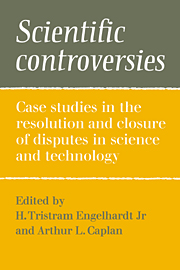 Scientific Controversies
Scientific Controversies Book contents
- Frontmatter
- Contents
- Preface
- List of contributors
- Introduction: Patterns of controversy and closure: the interplay of knowledge, values, and political forces
- PART I THEORETICAL PERSPECTIVES
- PART II CONTEMPORARY CASE STUDIES
- 12 Resolution of the Laetrile controversy: past attempts and future prospects
- 13 Federal regulation of Laetrile
- 14 Quasi libertarianism and the Laetrile controversy
- 15 Judicial deflection of scientific questions: pushing the Laetrile controversy toward medical closure
- 16 Politics, science, and the problem of psychiatric nomenclature: a case study of the American Psychiatric Association referendum on homosexuality
- 17 The diagnostic status of homosexuality in DSM-III: a reformulation of the issues
- 18 On arriving at the American Psychiatric Association decision on homosexuality
- 19 Values in the debate over workplace safety and health: the rancorous rhetoric about regulation
- 20 The successful experiment that failed
- 21 The power of efficiency: balancing benefits and costs in regulating occupational exposure to toxic substances
- 22 Closure in occupational safety and health: the benzene and cotton dust decisions
- 23 Nuclear fear: a history and an experiment
- 24 Closure and controversy: Three Mile Island
- 25 Understanding the nuclear power controversy
- PART III CONTROVERSY, CLOSURE, AND THE PUBLIC
- Author index
- Subject index
14 - Quasi libertarianism and the Laetrile controversy
Published online by Cambridge University Press: 03 February 2010
- Frontmatter
- Contents
- Preface
- List of contributors
- Introduction: Patterns of controversy and closure: the interplay of knowledge, values, and political forces
- PART I THEORETICAL PERSPECTIVES
- PART II CONTEMPORARY CASE STUDIES
- 12 Resolution of the Laetrile controversy: past attempts and future prospects
- 13 Federal regulation of Laetrile
- 14 Quasi libertarianism and the Laetrile controversy
- 15 Judicial deflection of scientific questions: pushing the Laetrile controversy toward medical closure
- 16 Politics, science, and the problem of psychiatric nomenclature: a case study of the American Psychiatric Association referendum on homosexuality
- 17 The diagnostic status of homosexuality in DSM-III: a reformulation of the issues
- 18 On arriving at the American Psychiatric Association decision on homosexuality
- 19 Values in the debate over workplace safety and health: the rancorous rhetoric about regulation
- 20 The successful experiment that failed
- 21 The power of efficiency: balancing benefits and costs in regulating occupational exposure to toxic substances
- 22 Closure in occupational safety and health: the benzene and cotton dust decisions
- 23 Nuclear fear: a history and an experiment
- 24 Closure and controversy: Three Mile Island
- 25 Understanding the nuclear power controversy
- PART III CONTROVERSY, CLOSURE, AND THE PUBLIC
- Author index
- Subject index
Summary
The Laetrile controversy is an excellent example of a controversy that raises fundamental questions concerning the relation between the individual and the state. Despite the overwhelming evidence that Laetrile is of absolutely no use in the treatment of cancer, many individuals continue to believe otherwise and are vigorously pressing their claim to be allowed the use of Laetrile. From their perspective, governmental bans on the use of Laetrile represent one more instance of a powerful state imposing its views on citizens who hold minority views. The freedom to use Laetrile becomes a civil rights issue. From the perspective of most of the scientific community and from those in the Federal Drug Administration (FDA) governmental bans on the use of Laetrile represent one more way in which the government legitimately protects vulnerable citizens against fraudulent claims used by peddlers of quack cures. To them the ban on Laetrile is part and parcel of the legitimate use of the police power, and the civil rights claim is just a smoke screen to protect the use of fraud.
It seems appropriate to step back slightly from the concrete details of the Laetrile controversy and to examine the more fundamental issues that it raises about the relation between the individual and the state. In what follows, I briefly outline and explain the advantages of a certain approach to political and social issues, an approach that I call quasi libertarianism, because it is an attempt to retain the many strengths of the libertarian position while avoiding some of its obvious weaknesses.
- Type
- Chapter
- Information
- Scientific ControversiesCase Studies in the Resolution and Closure of Disputes in Science and Technology, pp. 343 - 354Publisher: Cambridge University PressPrint publication year: 1987


